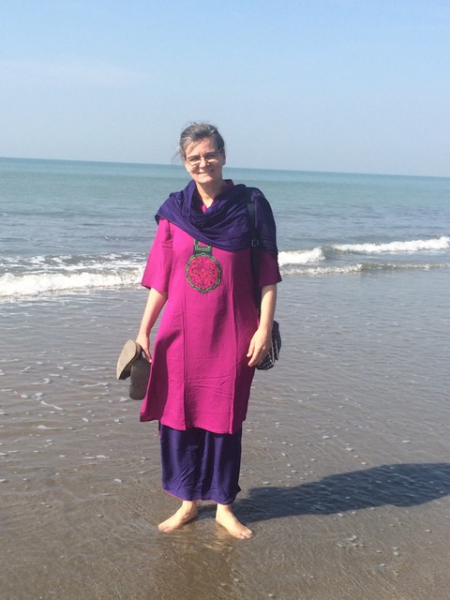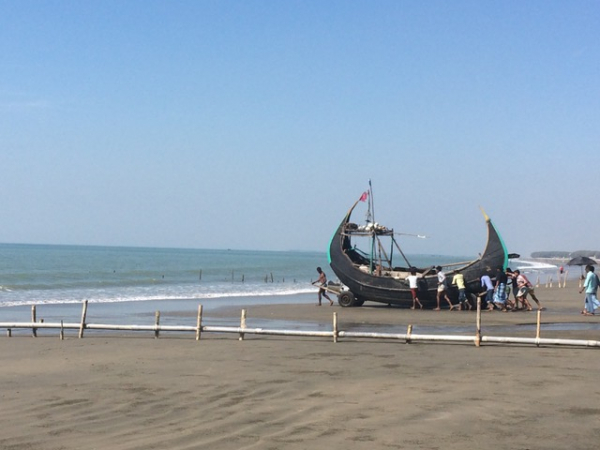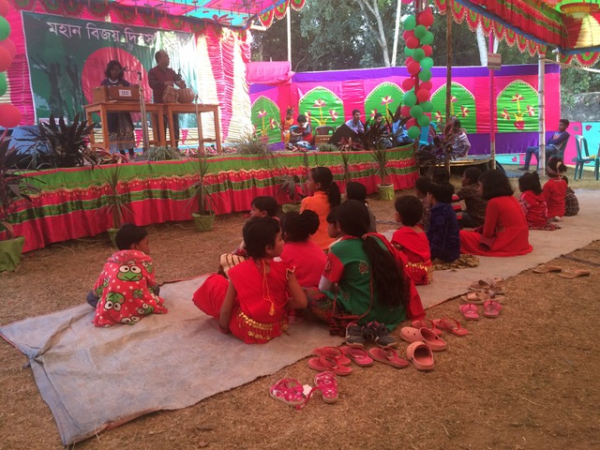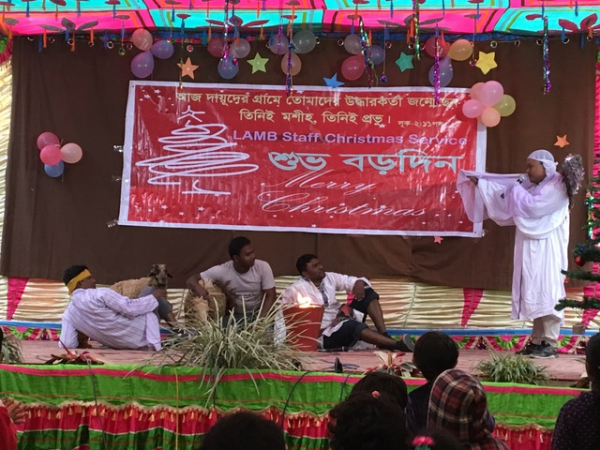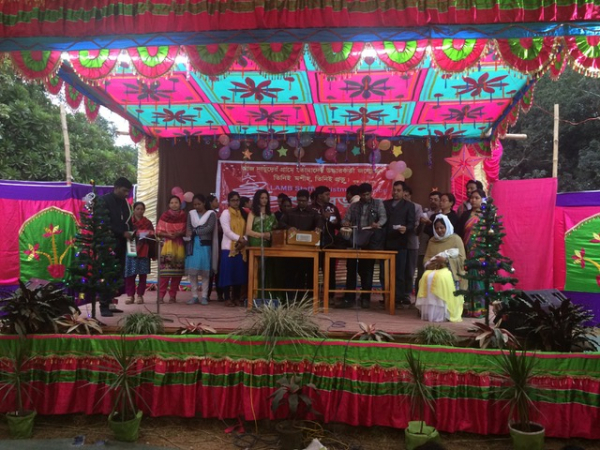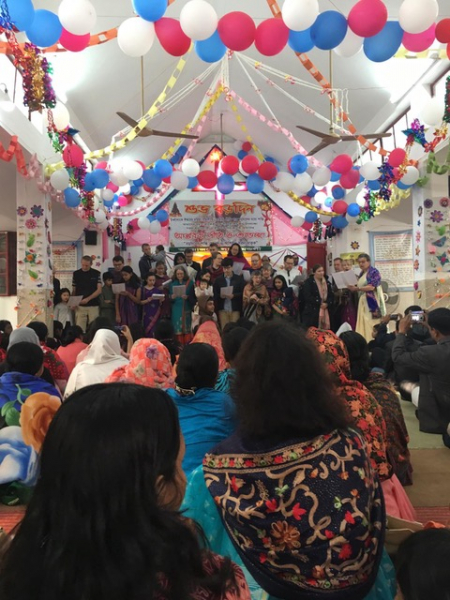Happy 1430
Written by Antje on May 22nd 2023 19:26
It's been a long time since I've written anything on this site. Finally another blog.
First of all, I want to wish you a Happy New Year. It is the year 1430 on the Bengali calendar. A procession started the New Year, dancing to loud music and then a traditional meal was eaten. Normally it is celebrated with even more grandeur, but because the New Year fell during Ramadan this year, the party was kept a bit sober.
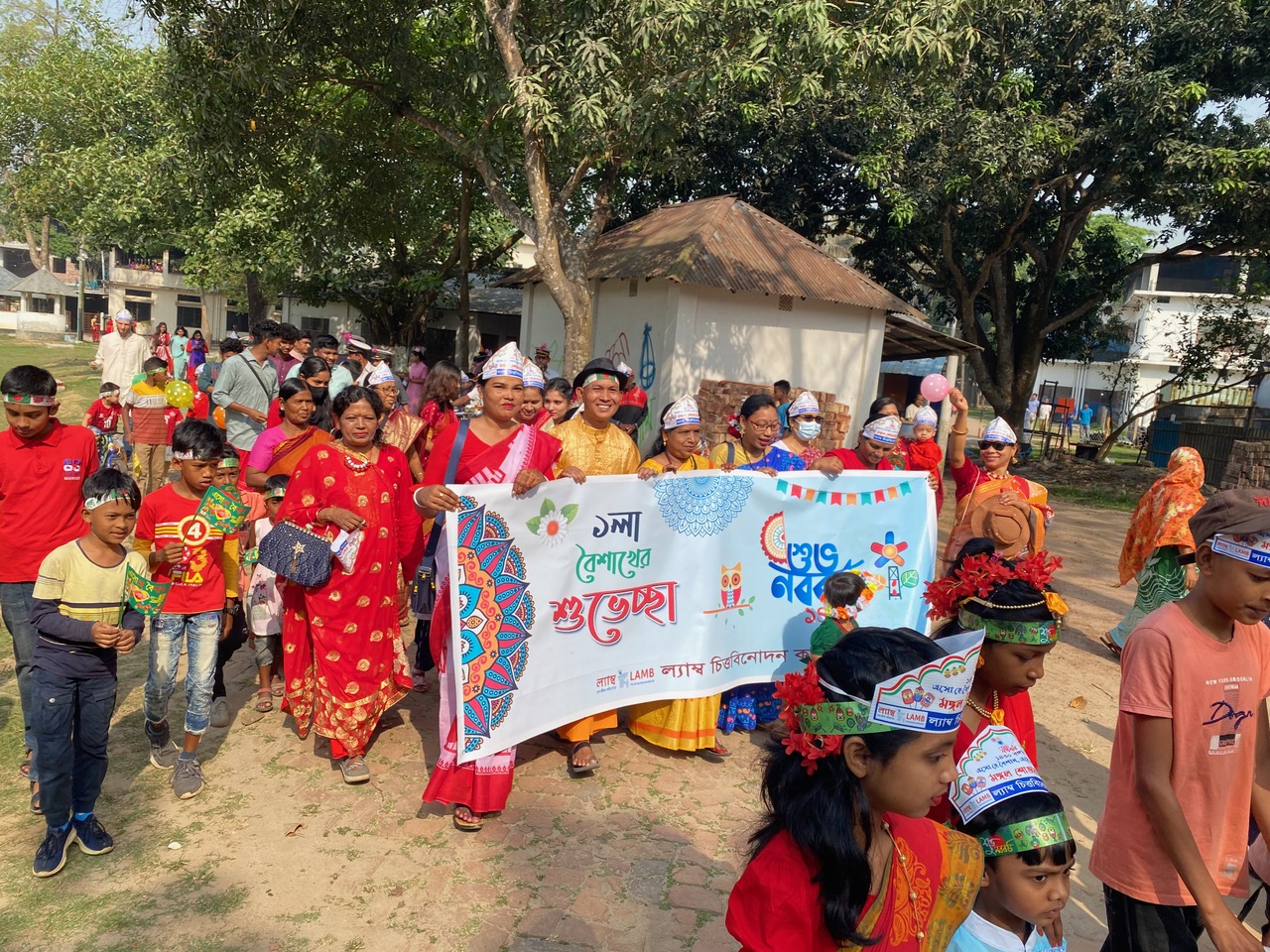
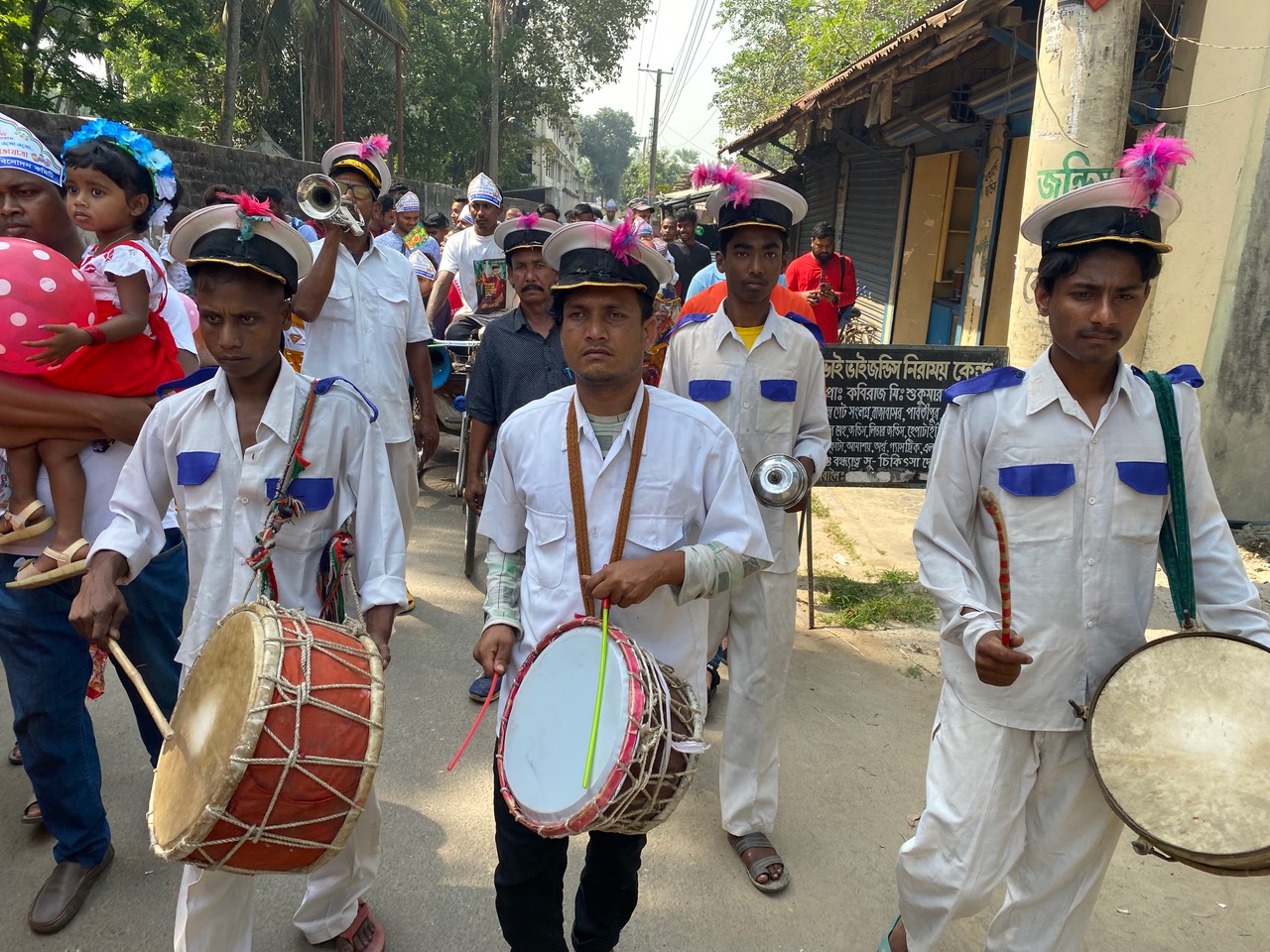
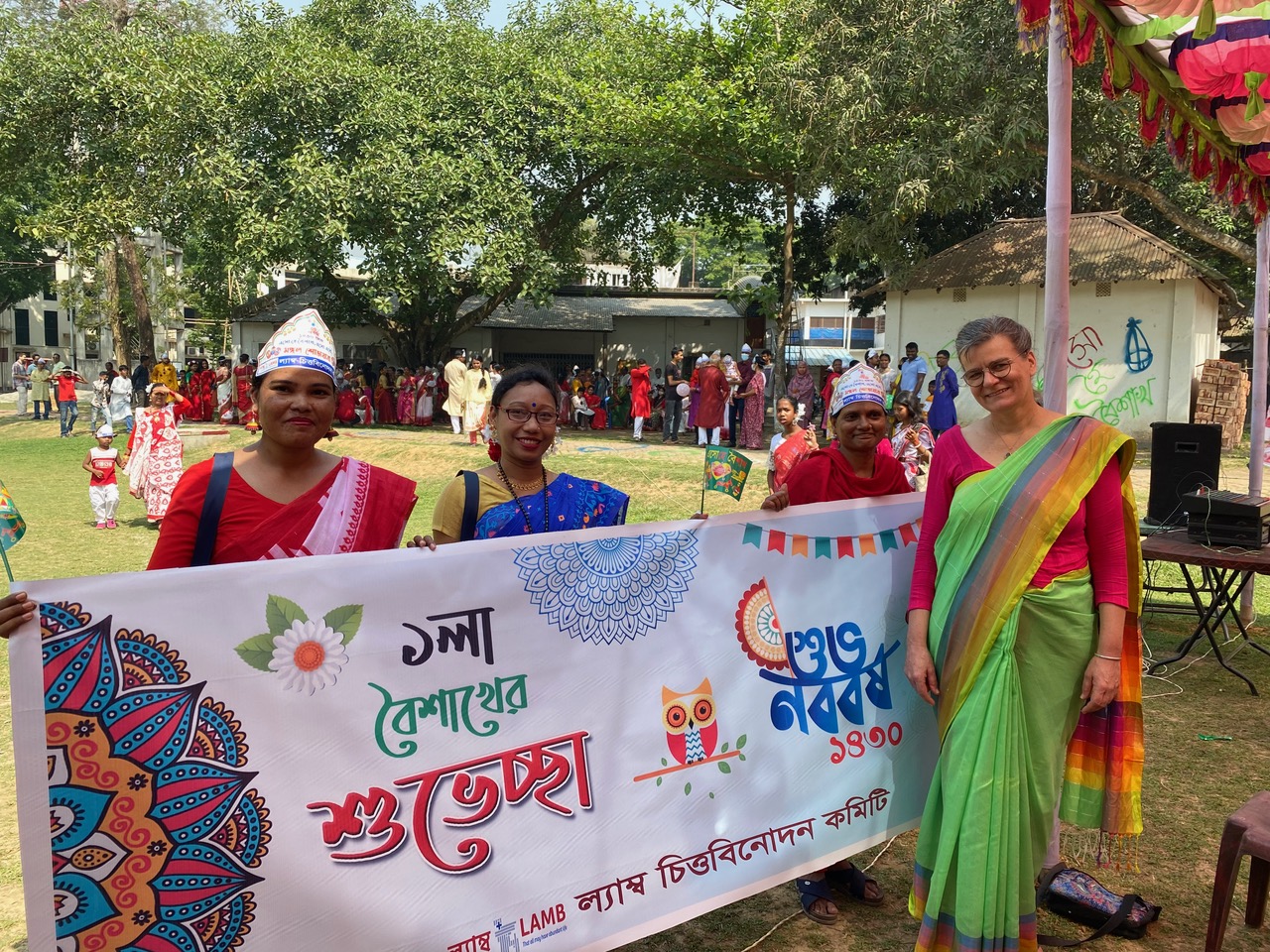
A ‘gardening’ event is being run on our hospital grounds. Young adults with a disability are given the opportunity to work. They maintain the gardens, run a nursery and since last year they also have cows for biogas production, as well as goats. They also take care of the sheep that are kept for the laboratory. Sheep's blood is used to make the media on which we can culture pus and other fluids to see which antibiotic works best in each situation.
Last fall, rice was planted on a piece of our ‘new land’. Now it was time to harvest. The foreigners were invited to help. It is literally back-breaking work. After helping for an hour, I could hardly move.
You can already see it in my posture in this photo:
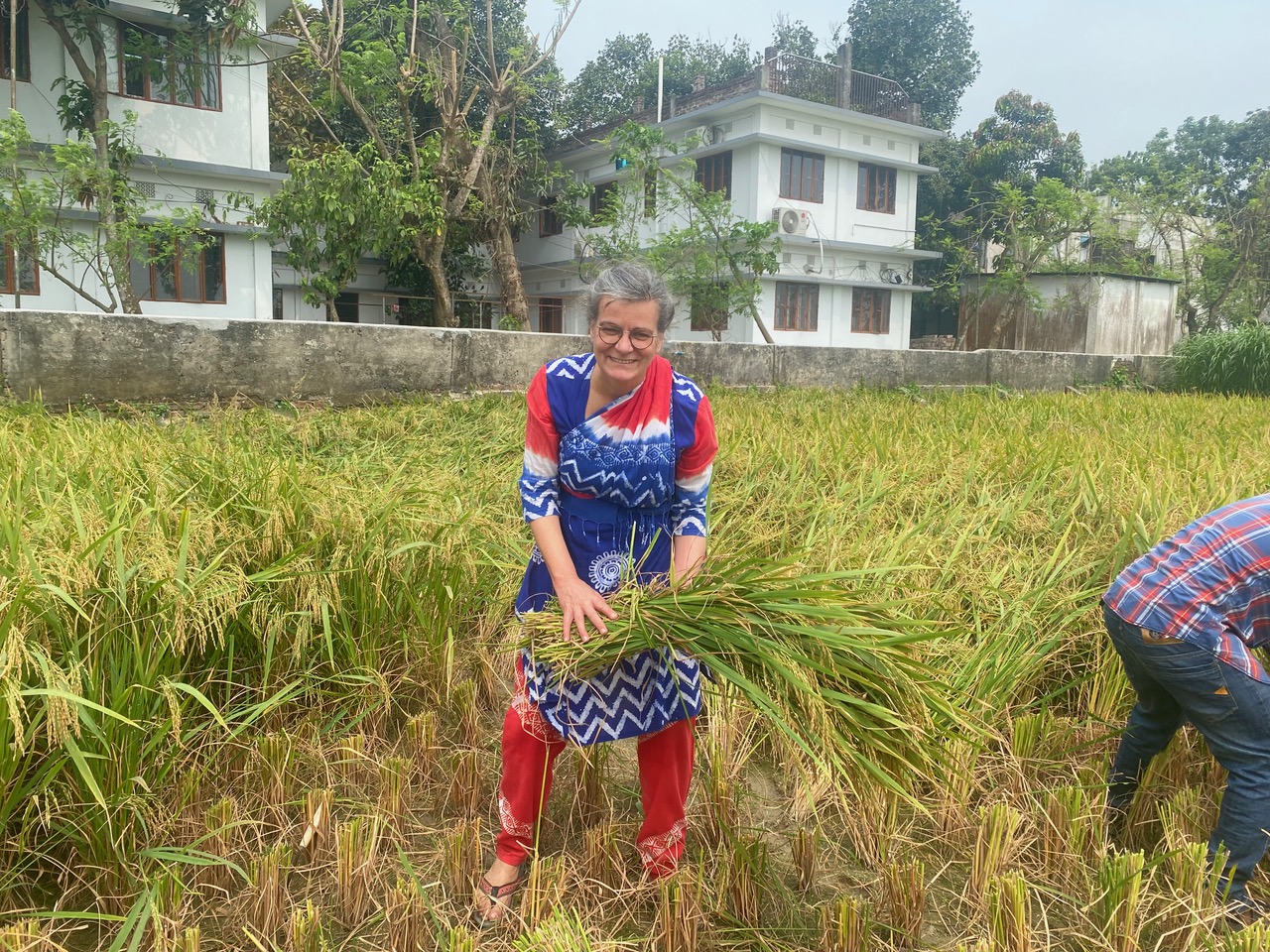
Movie of Antje harvesting:
And this is how it really should be done…
After the foreigners were exhausted, the ‘professionals’ moved on. This includes 2 of the disabled people, the rest are auxiliaries hired for the day and the supervisor of the gardening group. They've been busy all day.
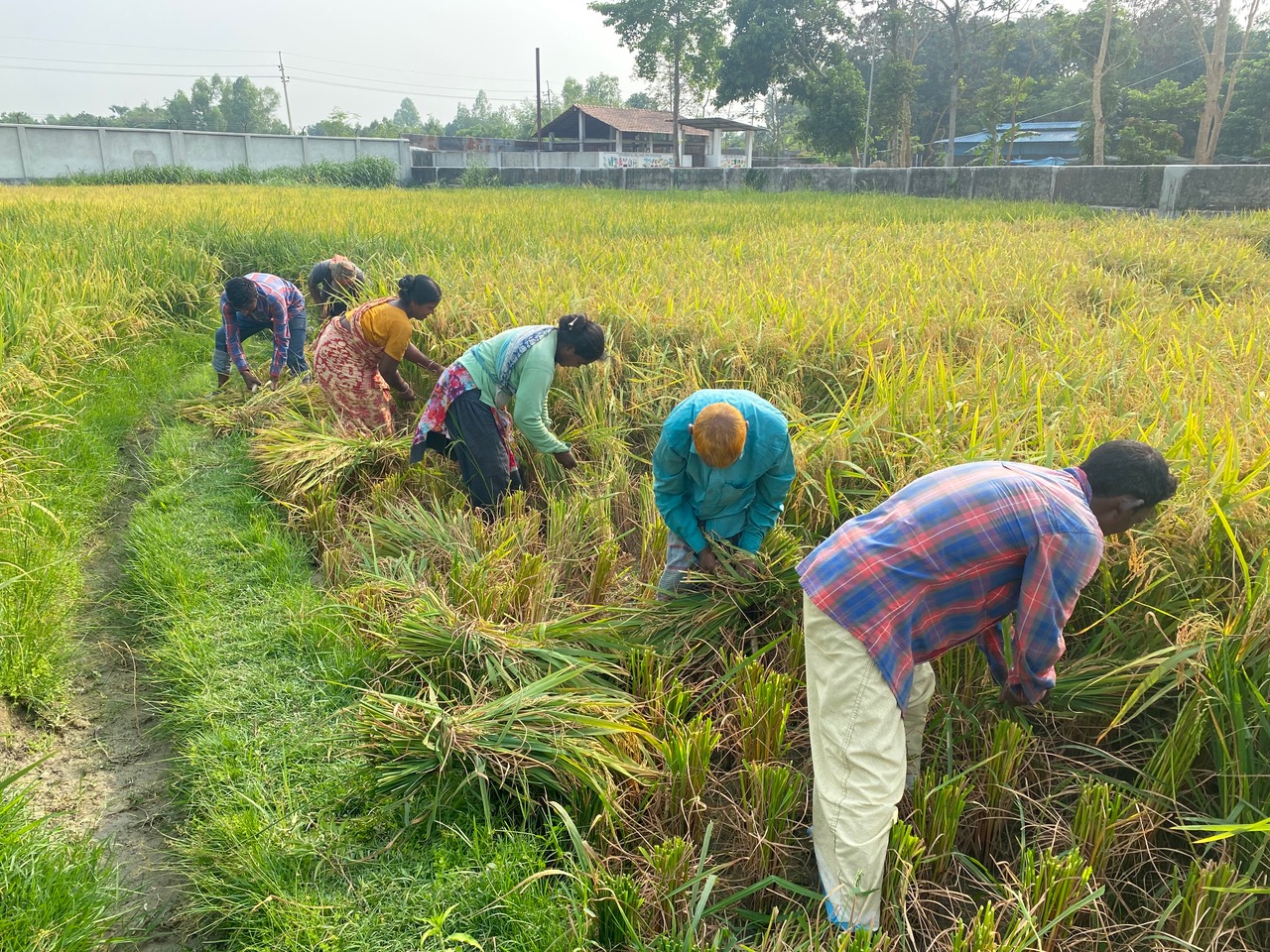
A machine was hired for threshing:
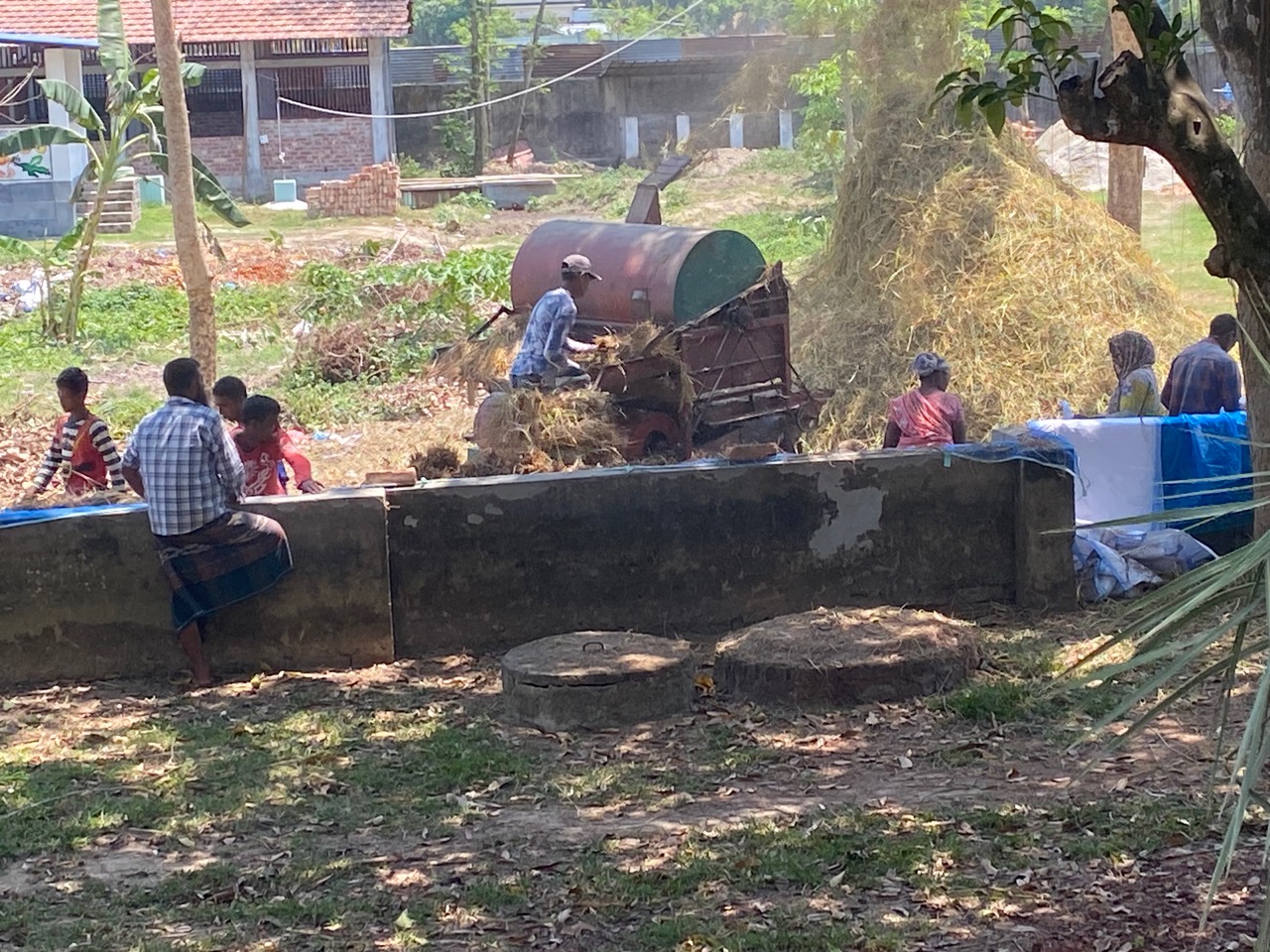
We were satisfied with the yield (see bags in the background):
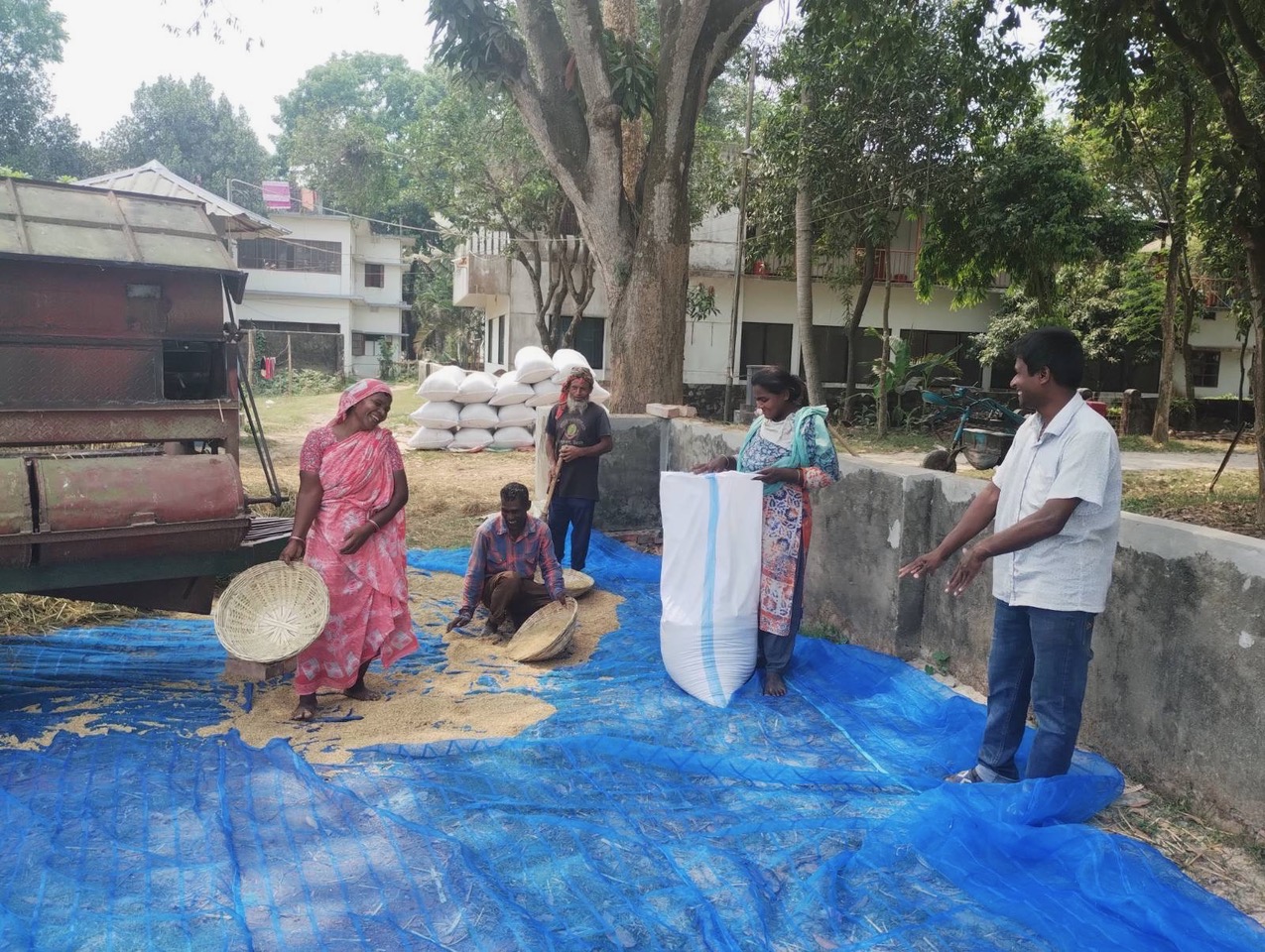
The rice now still needs to be cooked and then dried so that it can be peeled. The gardening group hopes to be able to use part of the rice itself, the workers receive lunch. The rest is sold.
Finally, a photo of some of our senior doctors. We are currently blessed with a fairly stable group of senior doctors in all departments, although the balance is still shaky.
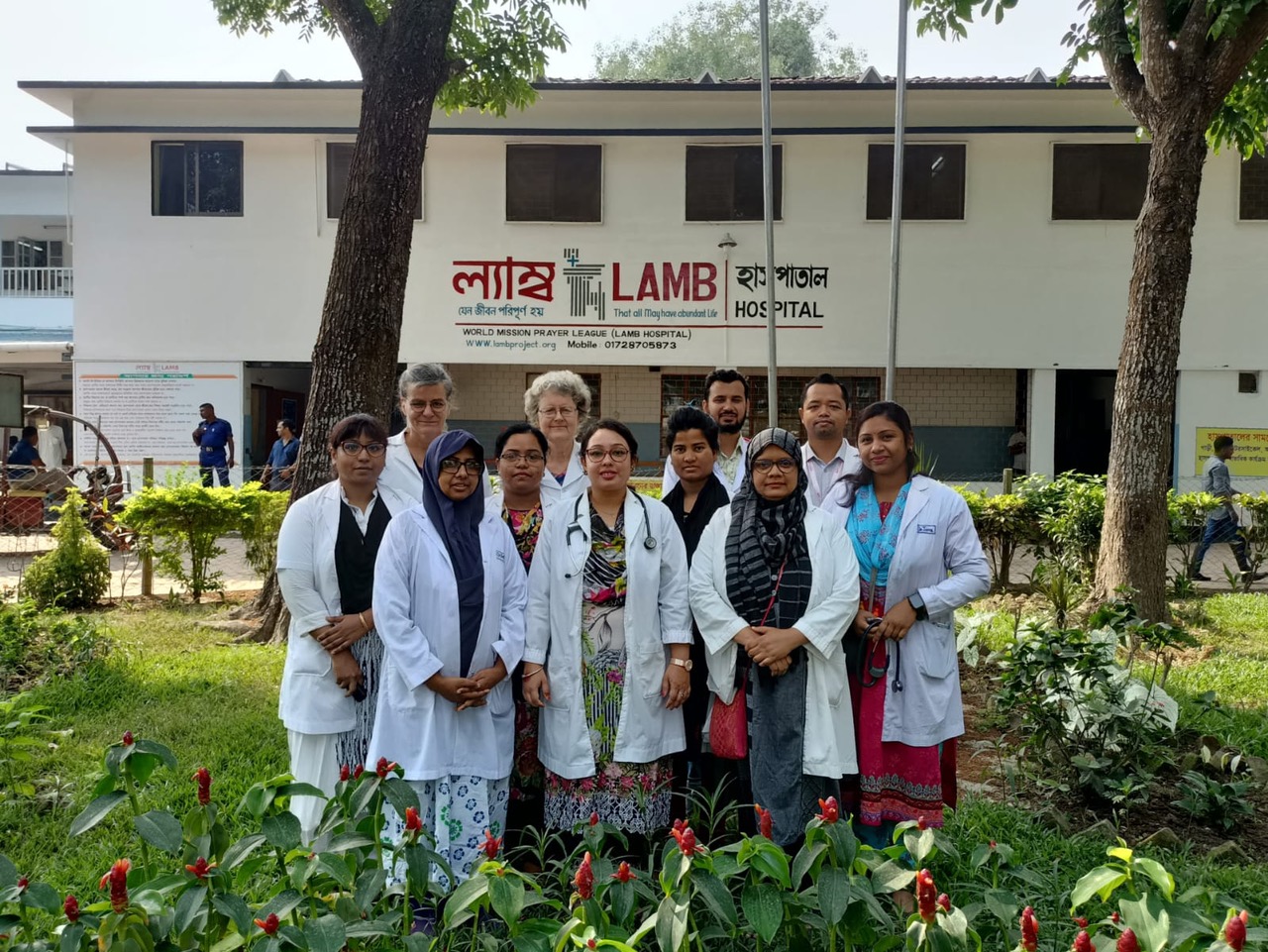
Happy New Year!
Written by Antje on January 31st 2022 19:42
Happy New Year from cold and damp Bangladesh. Since I have been “writing” this weblog the last few weeks, and also because it is still January, I have decided that a new year's wish is still appropriate! This time there are more pictures with less story...
For the last several weeks there is mist in the morning that gradually lifts. Because there is no heat in the houses, the inside temperature stays quite low. From my own experience, I can tell you that a house with an inside temperature of 14 degrees C, is not at all warm and comfortable!
On a more positive note: when the sun does shine it is then warm! Here is a lovely picture in the early morning with the sun rising…
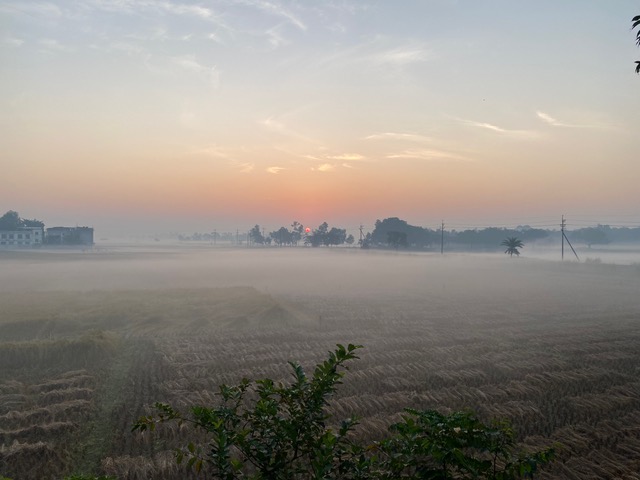
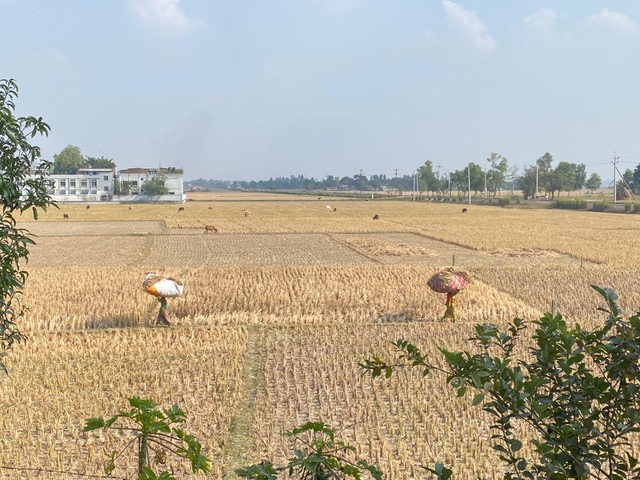
The rice fields next to my house are harvested. The women are carrying large bales of hay to their house.
For some time now we have a place in the hospital where people can go with questions about how to take their medicines. Awal has been working with us for over 25 years and continues to explain things patiently.
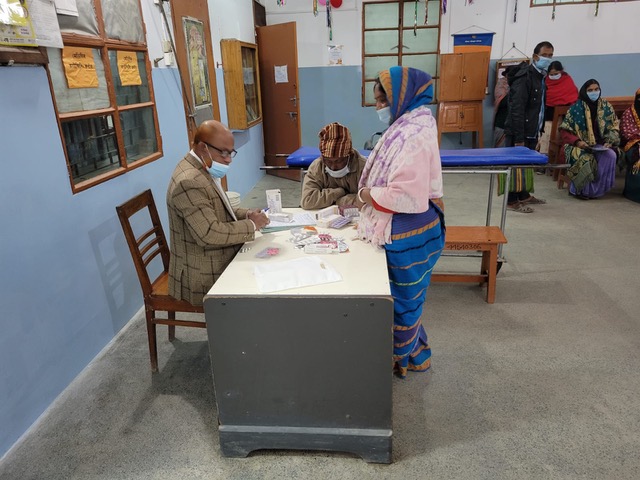
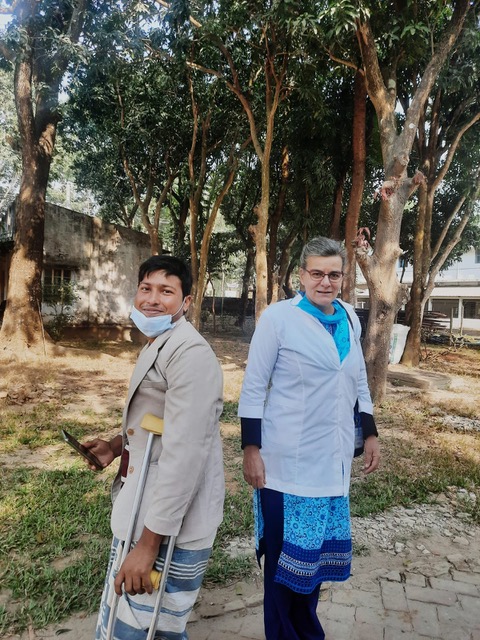
A patient who stops me on my way to lunch and asks: may I take a selfie with you?
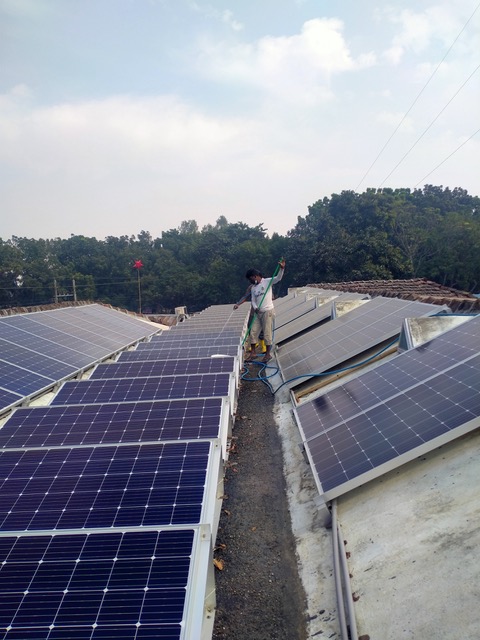
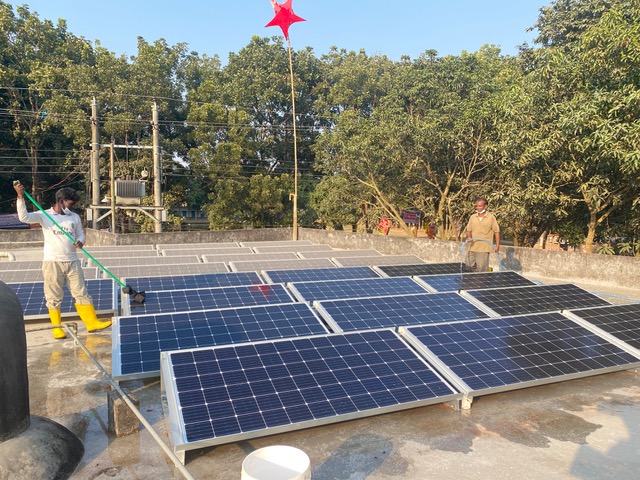
The solar panels, installed under my father's supervision, are being cleaned.
In contrast with the Netherlands, here in Bangladesh we could celebrate Christmas and the new year. At LAMB there are several celebrations — for the staff, for the hospital, for foreigners, and then also in the church.
The New Years and Christmas celebrations were held outside with (a little) social distancing and wearing face masks. There was no limitation to the number of people who could attend…

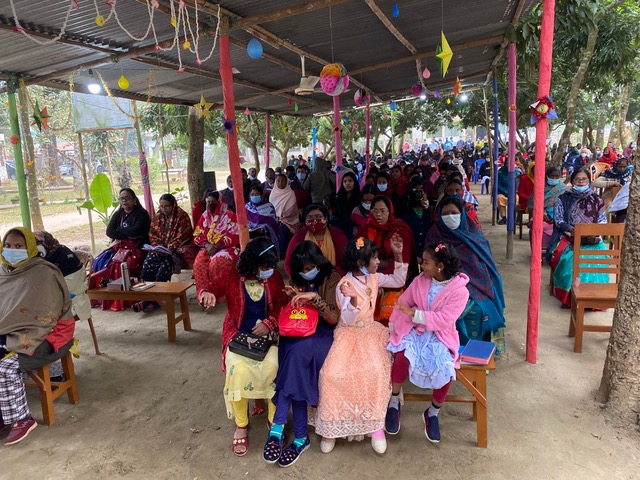
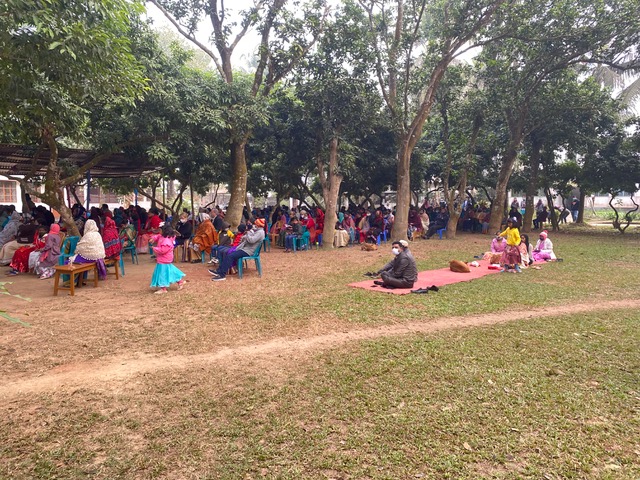
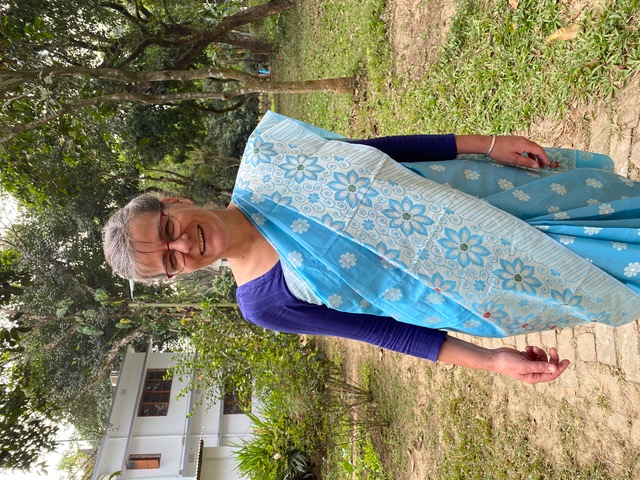
My Christmas sari.
The Christmas lunch was provided. Unfortunately I have no pictures of eating lunch…

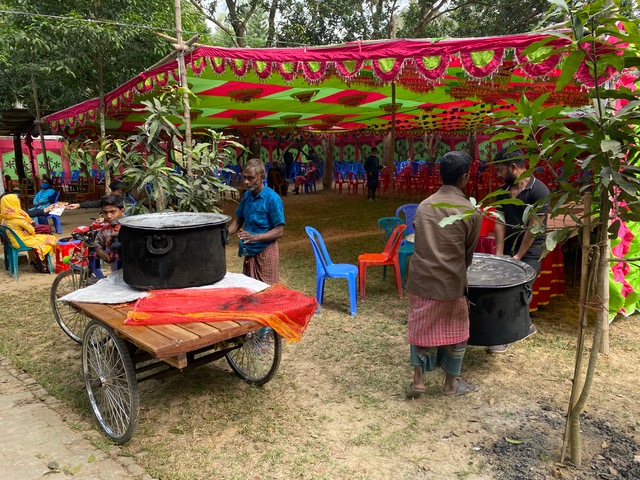
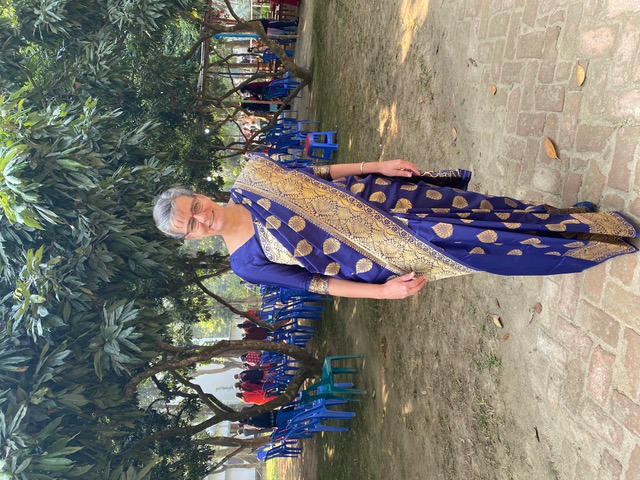
My New Year's sari
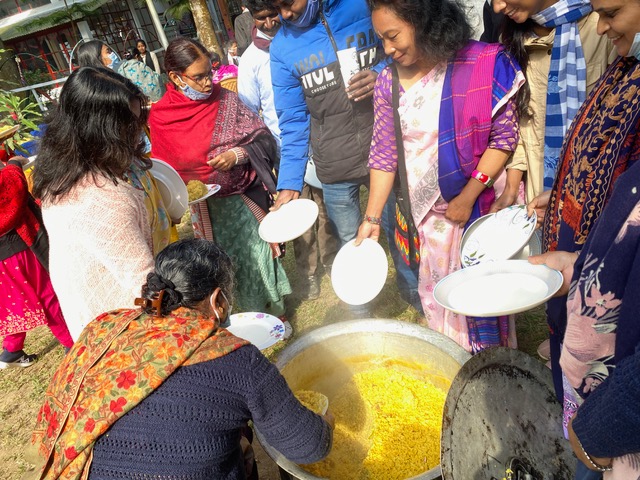
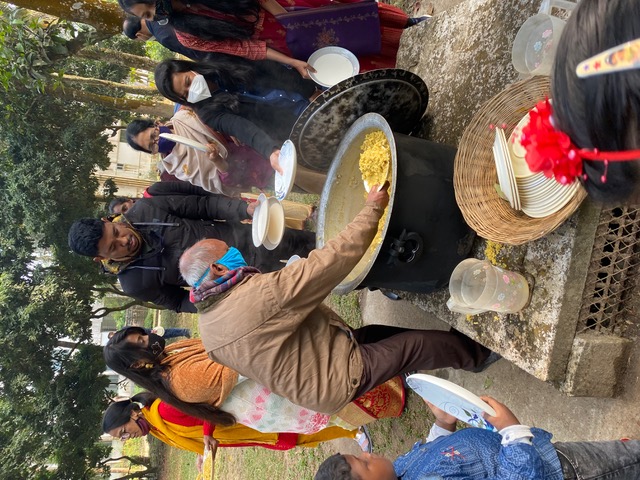
Eating lunch together on New Year's Day.
Christmas celebration with our maintenance staff. Visitors compliment us often how clean our hospital is. It is important for me to show appreciation to them for their work.
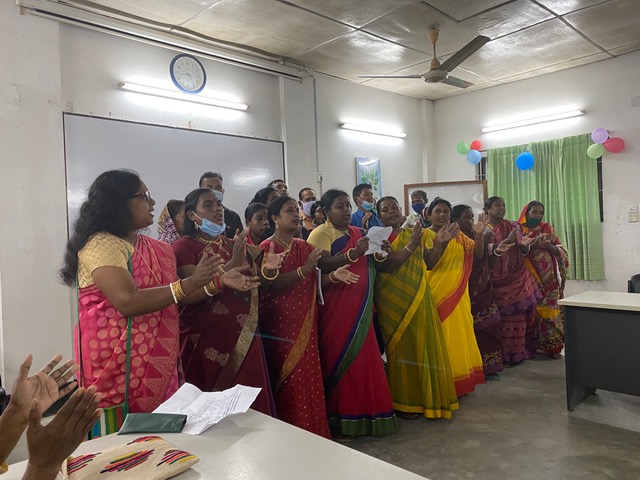
This group of young men in our church were told on December 30 that they had passed their final grade 10 exam. Most of them also had good grades, giving them a better chance of being accepted into a good school for the next 2 years of training. To celebrate this, at the end of the church service on January 1, their parents were treated to ‘mishti’, very sweet balls dipped in sugar syrup.
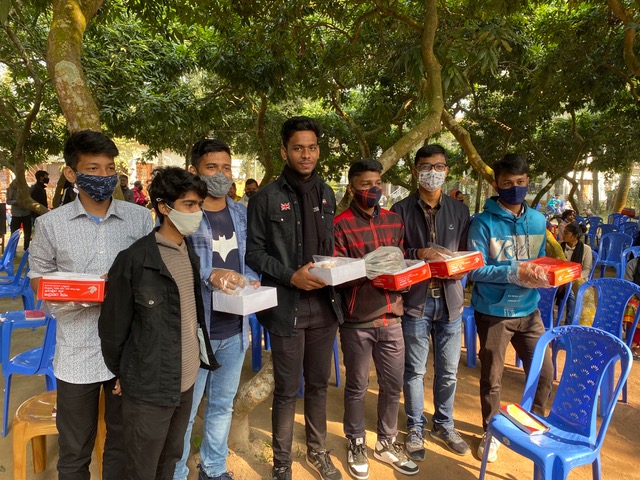
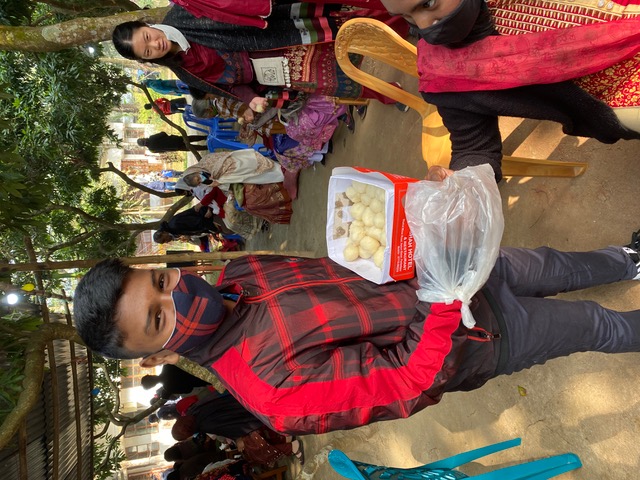
Corona in Bangladesh - Reflections on the last year
Written by Antje on April 7th 2021 19:35
Last month I received quite a few questions about Corona in Bangladesh, so here are some reflections on the effect of the virus on life here.
8th March 2020 is when the first person in the whole country was tested positive. Three people had returned from a trip to Italy. One of them died 10 days later. After 4 days’ warning, strict lockdown began on 26th. This was in contrast to the sudden lockdown in India: at least in Bangladesh people had time to return to their home villages. Schools had closed already, on the 15th.
Public feeling was very different than it is now. Then, it was blind panic. All that people knew about the virus came from TV images broadcast from Italy.
Our staff thought that they would certainly die if they only came near to a corona patient. We put a lot of effort into educating people about washing hands and keeping distance. We also installed extra washing facilities for staff and patients to clean their hands and worked hard to secure protective gear for the staff. We started quickly running out of anything at all that could be used for protection.
Our goal then was to keep receiving and treating as many ‘non-suspected’ patients as possible. Right from the start, most of the private clinics were shut but we didn’t want to follow their example. We set up pre-triage so that patients could be screened using a check list and thermometer, and a ‘verbal prenatal check’ so that expectant mothers with a cough or fever could receive advice from a doctor, and a separate emergency room for patients short of breath.
An isolation ward with 10 beds and an isolated delivery suite were also prepared.
All in all, the pandemic turned out to be really not as bad in our region as it could have been. We have only seen a handful of patients who were suspected of having Corona. Some were transferred to state-run Corona centres which weren’t very busy, and others were admitted to our isolation ward. We have had not even one single seriously ill patient.
There are several reasons why patients here haven’t gone down badly with it. People in the country are younger than in the Netherlands and there is hardly any obesity. There is also the theory that in a land such as Bangladesh where there is so much TB, the population has more resistance to Corona. Whatever the reasons, we are really thankful that we haven’t experienced much of a pandemic at all.
Until recently it was thought by some people that Corona must be a disease only caught by the affluent. We must all officially wear masks outside (practically nobody does) and keep our distance (impossible for Bangladeshi people). In practice, apart from government institutions, everything stays open, often with simply a sign saying ‘No mask, no service’ on the door.
Last month vaccinations started, using the AstraZeneca product. 50 million doses have been donated by India. Not really much for a population of 170 million. It will only be administered initially to those most at risk. The uptake was not really very enthusiastic because of fear of adverse reactions read about on Facebook. Everyone over 40 can now have their first jab. Quite a few of our staff have had their first dose and this month they are eligible for their second. As far as we know, there were only the 50 million doses available. I don’t yet know what the plan is when these are all used up.
o far, the vaccine has not been available to foreigners except embassy staff, so I myself have to wait and see…
Sadly, the schools still remain closed. Tragic for school children. Online teaching is officially recommended, but hardly at all accessible for the majority.
In recent weeks cases have risen again in the capital. The authorities have enforced stricter measures there which are often vaguely formulated so that we are questioning if they actually have any real consequences for our daily work life here.
Since Monday after Easter we have been in official lockdown again. No buses or trains are running and shops are closed. This is for one week apparently, but it’s unclear if it will actually only be a week long. This is reflected in our patient numbers, it’s very quiet in outpatients.
Our major concern is whether visas can be renewed for some of our essential staff. We are continuing to pray that we’ll be able to get them in the next few months. In the whole year that’s past, not one person has been able to obtain security clearance, which is the first step in the long visa process. Security clearance normally lasts for 5 years and mine is valid until 2023.
Here are some photos of our hospital during the Corona period.
First aid for patients with shortness of breath:

Pre-triage patient screening:
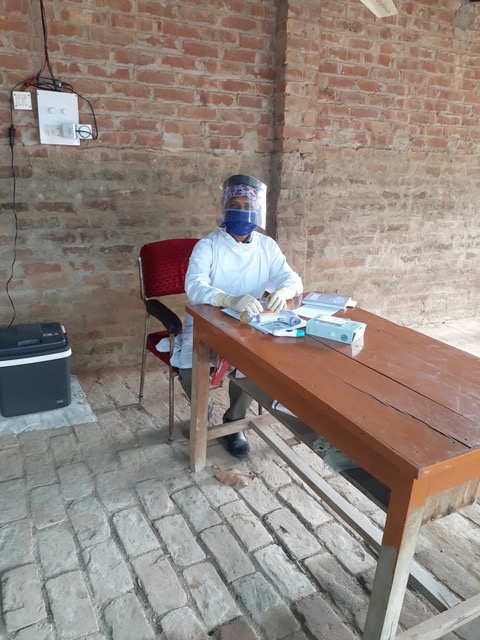
Doctors helping each other put on protective clothing:
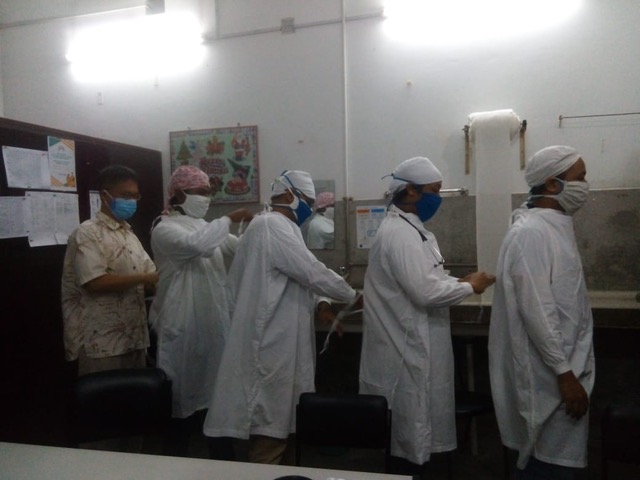
Christmas service held outside in order to maintain distance:
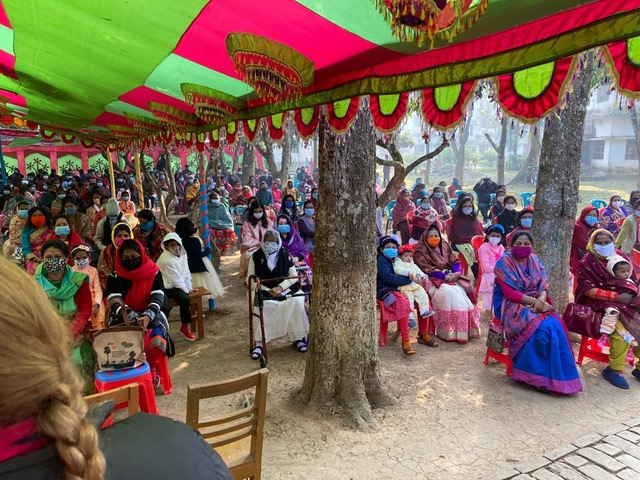
Living with a mask:
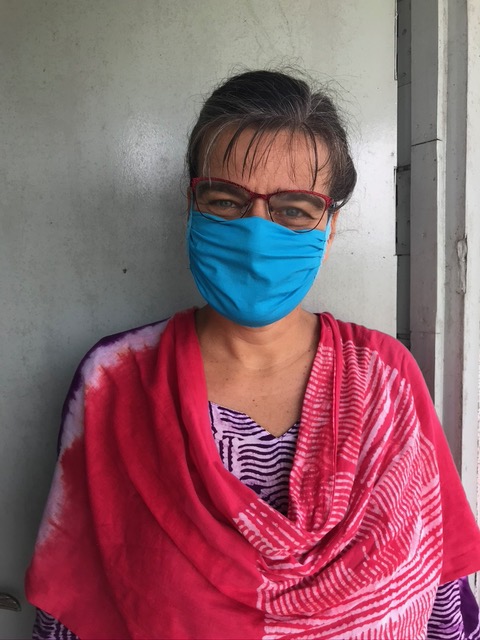
Visiting the office of the head of all NGOs (non-governmental organisations) in order to enquire about the rejection of our visas:
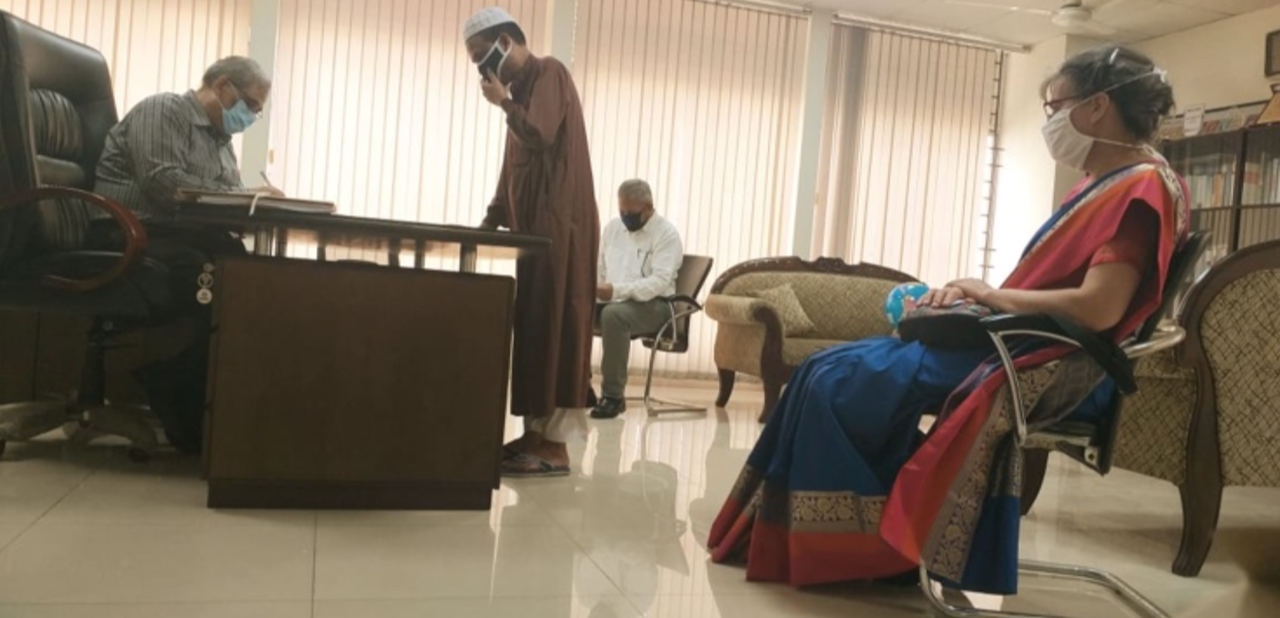
Winter in Bangladesh
Written by Antje on February 8th 2021 21:26
In the winter we have our dry season, during this time there is lots of dust and you can hardly find anything green. But things have begun to change this past week. In our area people have begun to irrigate and rice is being planted everywhere. I always enjoy seeing green again!
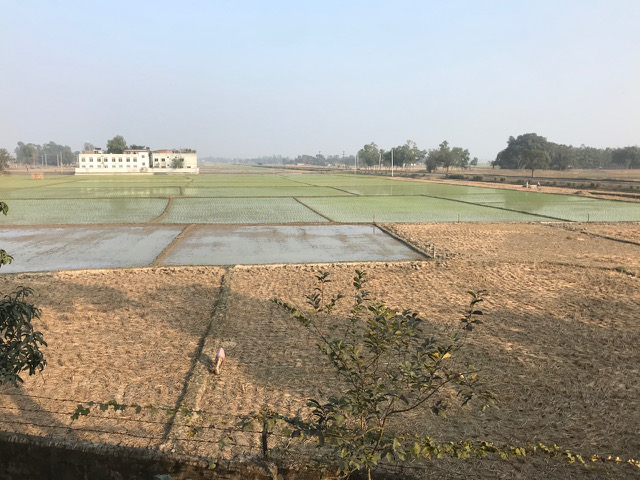
The water pump house with a plastic hose to transport the water to the right field:

It has been cold the last few weeks in Bangladesh. Of course everything is relative, but minimum temperatures are around 12 degrees and during the day about 18 degrees. If there is mist the whole day then it feels really cold. We do not have heating in our houses, but fortunately we have enough warm clothes! This picture made me smile! All the goats have a T-shirt of sweater on to keep them warm in the cold weather!
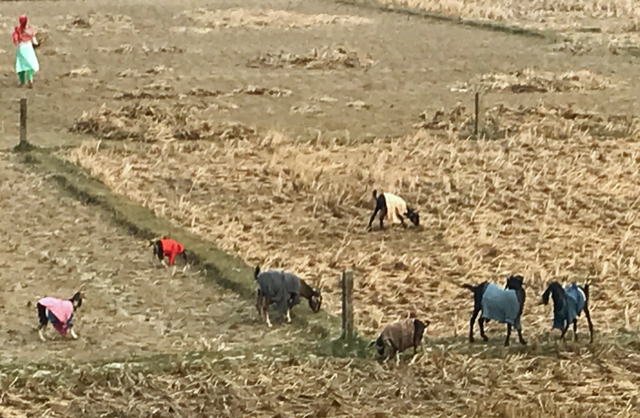
Here are a few pictures of our Christmas celebration. Corona regulations in Europe are rather strict, so we feel blessed with our mild regulations. Other than wearing face masks in the hospital, we are not very concerned about Corona. Here in the country we see very few serious cases of Corona. The majority of people can live freely and normally.
Blowing up and hanging balloons used for Christmas decorations in the hospital: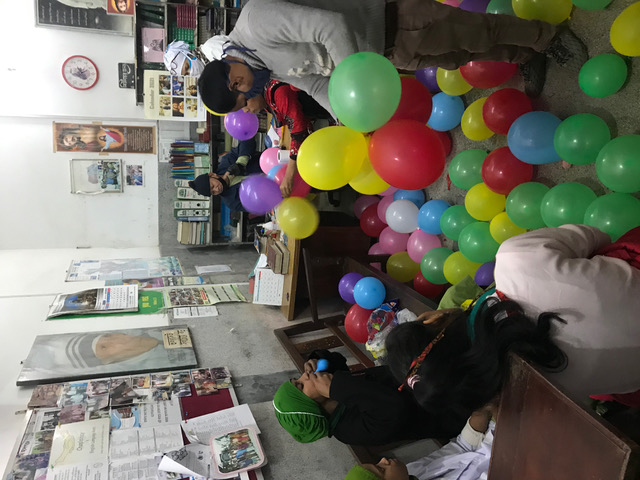
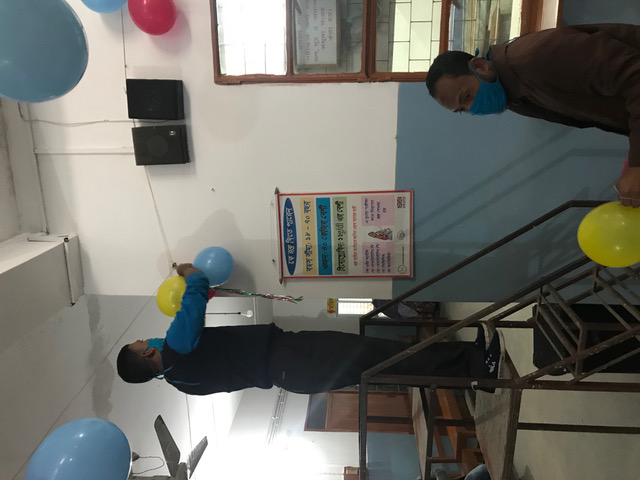
Every Christmas there is a celebration for the staff and patients where the Christmas story is told. I also am allowed to speak here.
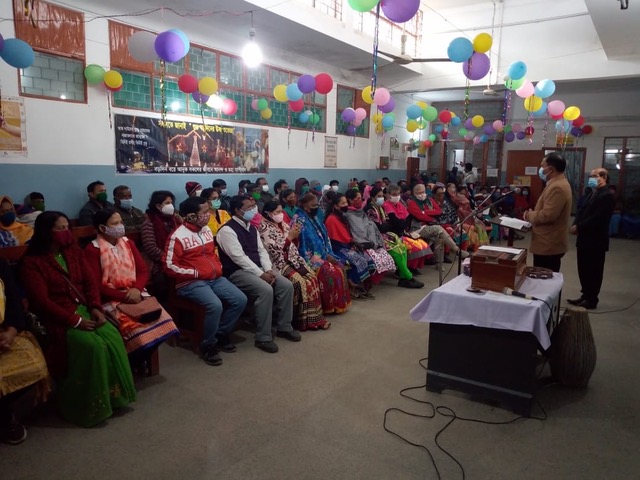
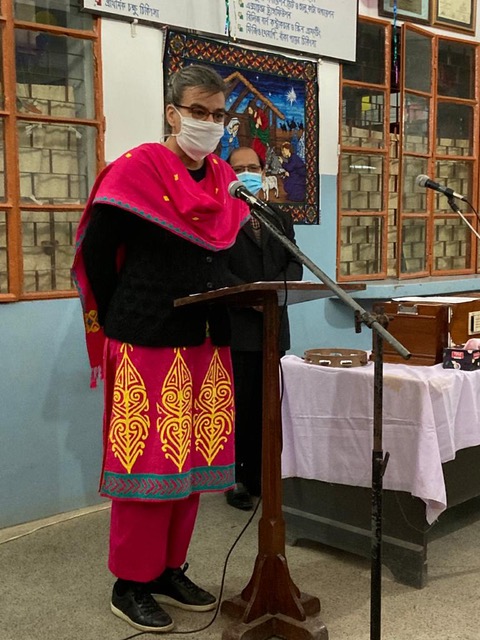
The church’s Christmas celebration was held outside so more social distancing could be possible. We also wore face masks.

As foreigners we were allowed to sing a song in English:
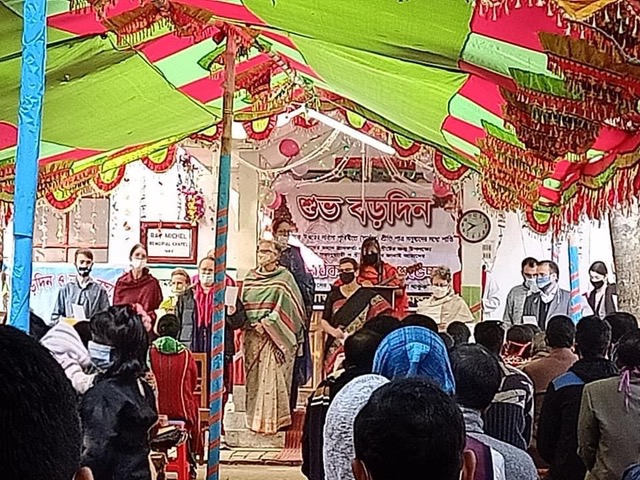
After the church service we did not have a meal together (normally we do). Many people were not happy with this. But after the New Year’s Day service we made up for this! Kichuri, a meal with rice, lentils and spices, was easy to share.
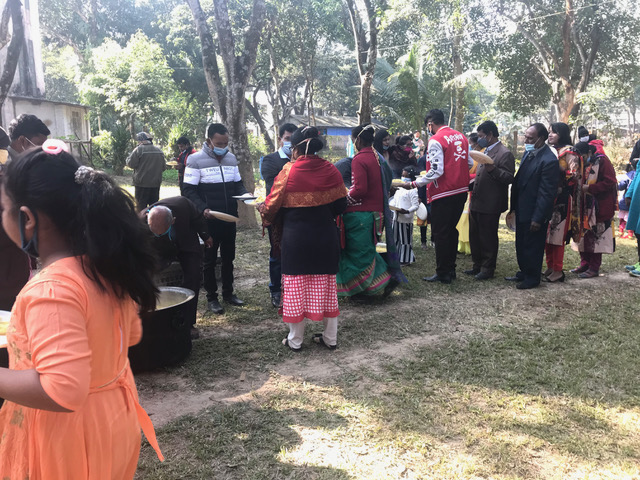
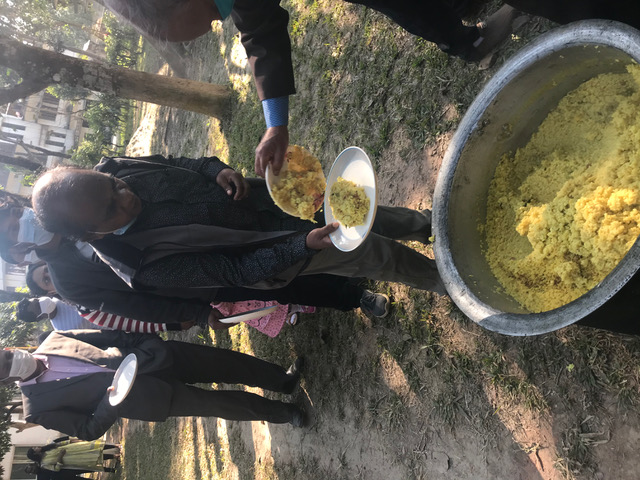
My housemate Kris and I went to visit our cook. Over the years she and her husband have been slowly building a brick house. Recently the house was painted which made it look very attractive. It was fine to hear that one of their daughters paid for the windows and that the paint was paid with money from selling a cow. In the picture Kris and I both have a Sari on because is it a celebration.
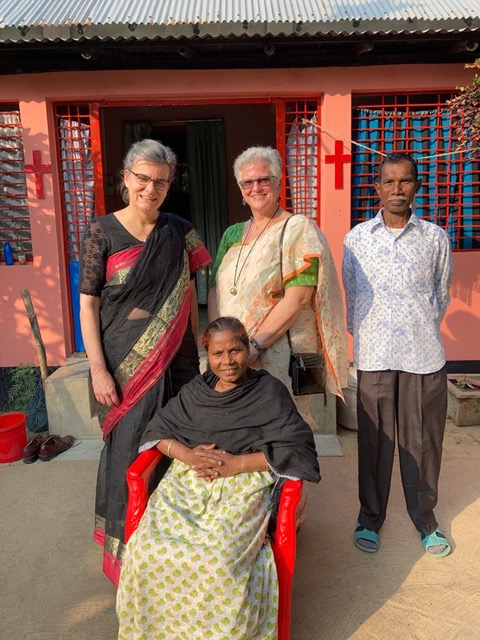
With regards to my work: It remains difficult for me to find a good balance between working as a surgeon and as Medical Director. Surgery is clearly my first love. Regularly I see patients with problems that in The Netherlands would have been earlier diagnosed and treated.
The most recent example is a girl with a congenital defect in her anus. In The Netherlands this abnormality would have been treated in her first year of life. When she was 7 years of age she had her first operation and unfortunately had no further checkups afterwards. Constipation is often a problem with this abnormality. Now, 10 years later, she comes with a belly that is literally full with poop (she looks like she is pregnant). I hope that after operating on her, her constipation problem will be better under control.
Consequences of the storm
Written by Antje on May 27th 2020 21:12
Here is a short message because I have had many questions about the cycloon Amphan in our area. In Bangladesh, there was a tidal wave on the coast, with an estimated 220,000 damaged homes, with over 50,000 being completely destroyed. Fortunately, most people were able to reach a "cyclone shelter" in time. This is a sturdy building on stilts designed to withstand such storms. This helped to keep the number of deaths to around 20.
In the north, where we are located, we had mainly a storm with high winds. Several trees were blown over, houses were damaged but fortunately the damage is minimal.
I was awakened, Thursday morning, at 5:30AM when the tree next to my bedroom was blown over. Fortunately it fell on ground that was not used so we didn’t have any damage to worry about.
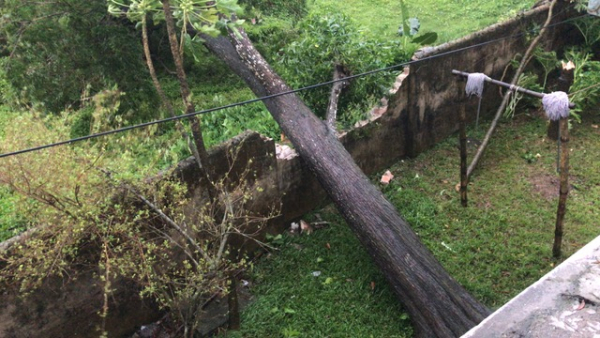
But with closer inspection, we found that the roots of the tree had damaged one of the drains in the bathroom. That means no warm showers. . . But fortunately we have water in the kitchen and can use the other toilet.

Today 6 men worked the whole day to remove the tree, but unfortunately that was not possible. . . They did remove all the branches from the tree...
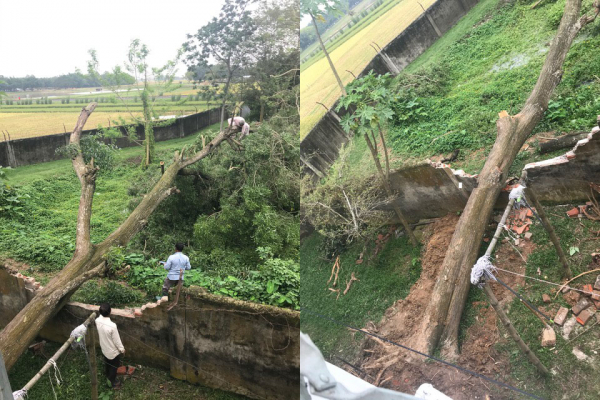
The next drama can be seen in the picture: the ground under the tree moved visibly with every gust of wind. In the end, from the roof, men sawed the branches with leaves off with saws fastened on bamboe sticks thus making the tree catch less wind. Now that the wind has stopped the tree can be cut down.
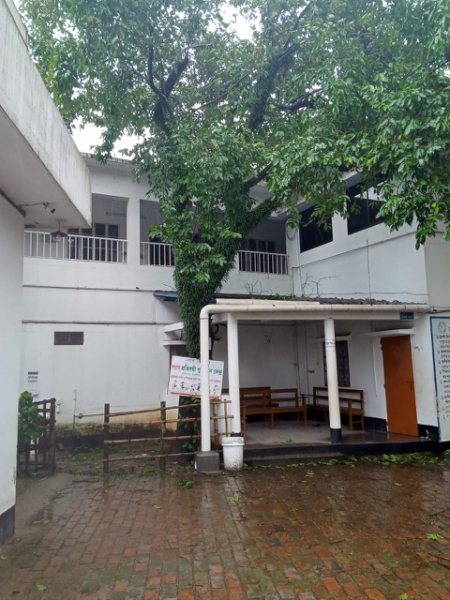
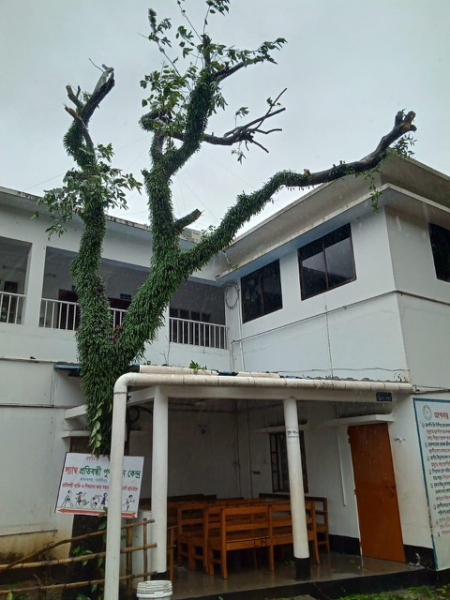
A tragic side effect of the storm is that all the unripe mangoes were blown out of the trees. Our neighbour’s children worked diligently yesterday to gather them. I helped part of the day to peel, remove the pit and cook the mangoes to make mango puree—this is delicious and is similar to apple sauce. Unfortunately this means that there are less mangoes for the mango season and that mangoes will be more expensive.
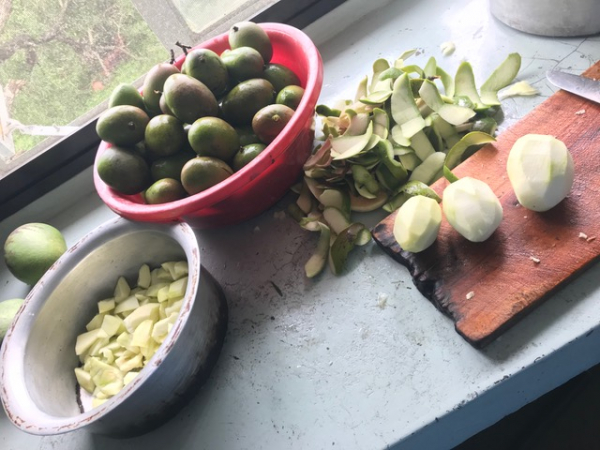
Before the storm, fortunately, most of the rice was harvested, which means that the damaged here is limited.
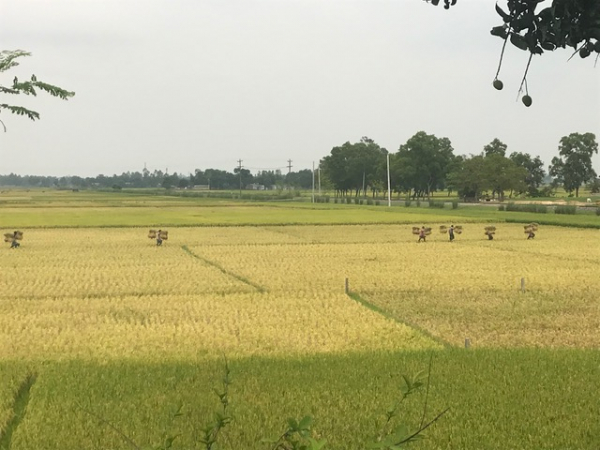
As for the Corona virus: the number of cases is increasing but moderately. There is still no public transportation, but with the end of the Ramadan coming people have been doing more shopping.
On the other hand, there is a lot of fear for the virus which results in strange behaviour. In this picture you see a mother and father wearing protective overalls. But these are not closed properly and therefore do not protect. As you can see the children are leaning against the side of the protective clothing. Even among our own staff there is much fear-- even with training and information this fear is only partially taken away.
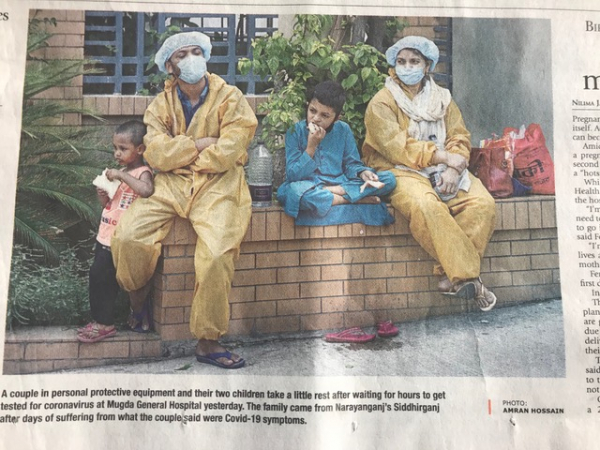
Happy New Year and corona...
Written by Antje on April 20th 2020 20:40
Yesterday was the Bengal New Year. Normally it is a holiday with time for a parade, games, a kind of fair with tasty snacks and a cultural program. It is one of the festivals, which is equally accessible to all people in Bangladesh — to all religions and without political connotations.
This year it was terribly quiet. Everyone was at home, and there were no parties. This picture is a drawing of a flat in a good neighborhood… Notice the people below in full PPE (personal protective equipment).

The last major event we had before Corona’s arrival was our organization's, LAMB Hospital, picnic, on Feb. 28. I had just returned a few days earlier from my furlough. We left early in the morning, nicely dressed in 13 buses from our hospital grounds:

We drove to a ‘picknick spot’: a place where many companies / organizations come with their staff to see the park, purchase inexpensive toys for their children and hopefully buy sweets. In addition, there is a packed lunch for everyone. I don’t really like these parks, which are full of people, so I choose to make the packed lunches instead of checking out the park. Here we filling plastic bags with lentils:

Here are the packed lunches-with rice, goat curry, barbecue chicken and linzen. A small bottle of seven-up is also included:

The line to get your packed lunch! It takes quite some organizing to distribute 600 lunch packets!

But shortly after the picnic, the threat of Covid-19 became more real: first of all, there were more and more reports about the epidemic in Europe. People returning to Bangladesh from China and Europe were also in quarantine, schools closed… And finally March 26 brought a ‘lockdown’. Public transportation stopped, most shops are closed and non essential jobs work at home. That sounds similar to the situation in the Netherlands.
What is very different here in Bangladesh is that we have a very large group of people who work in the ‘informal economy’: these are day-wage workers, people with small tea shops, people who sell sweets where there is traffic jam, people who drive rickshaws. For the last 3 weeks all of these people now have no income and therefore have no money to buy food. Help programs have now been set up to help these people eat…
Another group of people affected are people who work as household help. Many families are afraid to let people in from outside.
Another group of people affected are people who work as household help. Many families are afraid to let people in from outside.
Getting enough protective suits has been a problem for a long time. That seems to be getting better now. In the photo one of our doctors is wearing a donated suit, to thank the donor. So far we have not had any real suspicious patients.

Since the beginning of the crisis, most private clinics have been closed and only emergency patients are seen in most places. We aim to at least maintain the care for pregnant women and help during the delivery.
The healthcare system in Bangladesh is really inadequate for a real epidemic. There are almost no ICs with ventilation capacity. If an epidemic really strikes here, many people will die. We pray hard that it will not be devistating. However, many new cases have been confirmed in the past week, throughout the country, partly because more tests can now be given.

Power failure in the hospital!
Written by Antje on September 5th 2019 11:27
The last two weeks were filled with concern about the power supply. One of the main fuses, where power enters the compound, burned out. Apparently, this fuse was already in need of replacement, but the correct part had not been found by the people responsible for purchases. Now the situation had suddenly become urgent.
Thankfully the hospital could be supplied by a generator, but the rest of the compound had no power. This month it is around 34°C by day, with high humidity, so it feels like 40°C. Not pleasant without ventilation. The fuse was temporarily replaced for a few hours, but it soon became apparent that this was very temporary indeed because it started to overheat!
Yesterday this fuse was replaced by another, which caused a fault. A number of switches burned out. Suddenly there was a total power cut. Including the hospital. There are often power failures in the hospital caused by a failure of the local network, but normally the main generator is started up and within a couple of minutes there is power again. Not now. It was thought that the problem would continue all day.
Now we had to think very seriously of priorities. We do have a small emergency generator which was ready as a backup for the replacement of the fuse, but it became now essential. Most of our oxygen supply comes from oxygen concentrators: machines which extract oxygen from the air and deliver it to the patient. The advantage of this is that we don’t have to bring in many cylinders from the city. The disadvantage is that they use electricity. An emergency cable had to be run from the emergency generator to the neonatal ward, to the delivery suite and to the operating theatre. That was quite quickly sorted out.
No power also meant that our ultrasound didn’t work, and we had no Xray possibilities. The laboratory also didn’t have any electrical power so we couldn’t do many diagnostic tests. After an hour we managed also to run an emergency cable to the lab so that we could start tests again.
And then, after about three hours without power, complaints started coming in that there wasn’t any more water! The water pump that normally fills the water tanks had also stopped. As well as this, from the moment that there was a power cut in the first place, there were no ventilators running on the wards so it was hot everywhere!!!
Thankfully after about four hours, an emergency solution was found and we had power again. However, we were warned that no air conditioners could be turned on; as most of the wards don’t have any, that wasn’t really much of a problem. Finally, one of our staff arrived yesterday evening from Dhaka with the right part, which was installed in the middle of the night. Hopefully everything will be OK again.
I’m thankful that it really rained hard yesterday morning, just before all the fuses blew. Because of this, we had many fewer outpatients than normal. So we were able to see the patients who did actually manage to come, despite the dark, hot examination rooms.
And I was really impressed how well people here cope in a crisis. I didn’t hear a single complaint from the patients. People in dark, hot wards had their own fans which they could wave and didn’t complain. Nobody asked how anything like this could possibly have happened. Our own staff just responded by doing what needed to be done and got on with it.
Here is a photo of me with our new dermatome for removing skin for transplantation. About half a year after our old one broke, we bought this second-hand one. It works really well! I’m thankful for people who support us in all kinds of ways and keep the hospital going.

The rice has almost everywhere been planted again...
Family visit and food parcels
Written by Antje on August 7th 2019 21:10
Last week my sister and her husband and their children came to visit me. It was an opportunity for them to see a part of my work here. My sister and niece were willing to dress like Bangladesh ladies. I gave them a tour of the hospital. My sister even watched an operation. In a nearby village we visited a ‘safe delivery unit’ and a group for young people. One of the purposes of this group is to discourage young people from marrying too young. We also visited one of our nursing assistants at her home.
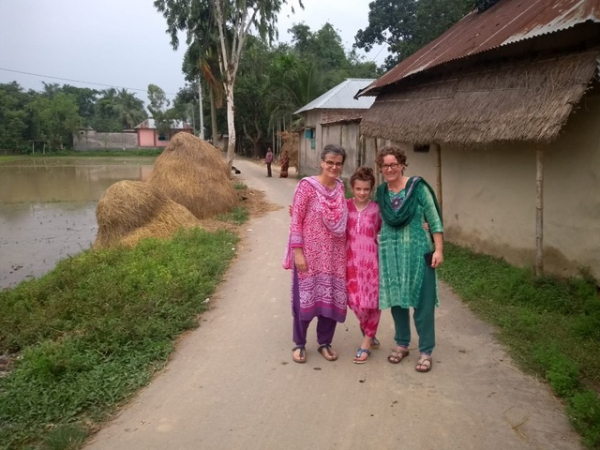
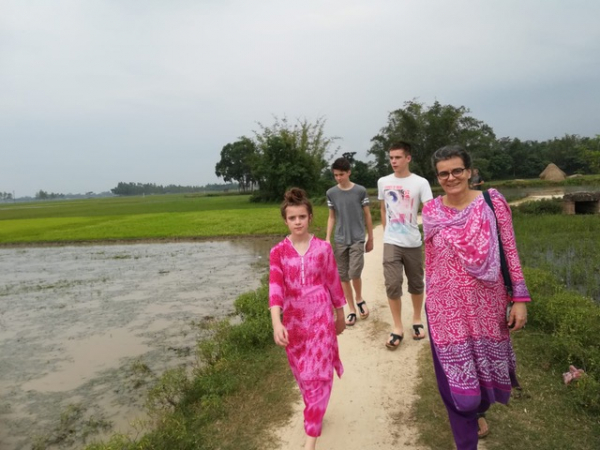
We made a trip to Saidpur, a nearby town, to do some shopping. Because of the rain season, we had a heavy rain shower.
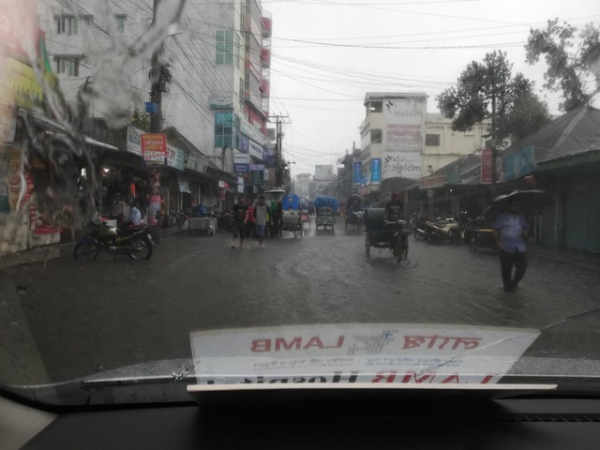
After a train trip to Dhaka we spent the afternoon at the Dutch Club—and even went swimming!! The second day we visited the old city with its river port. Here all the ferries from the southern part of the land come in. I enjoyed having the family for a whole week. It was good to renew and strengthen our bonds together.
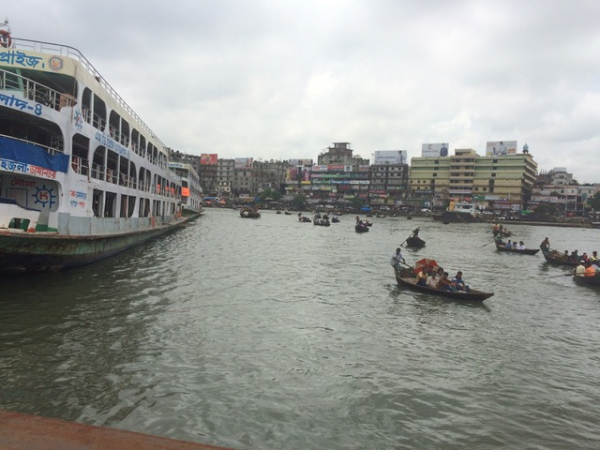
Bangladesh is now in its rainy season. That does have some advantages—for instance the rice fields are under water and do not need to be irrigated to plant the rice and the days that it rains it is cooler. Unfortunately this also means that the rivers have more water. The large rivers come from Nepal via India and collect quite a bit of water along the way.
In our work area there are communities living in “char” areas. This is a sandbank along the river which doesn’t flood every year. People live and grow crops here. This year parts of those “char” areas were flooded. I took this picture last week when I returned from Dhaka. In the middle the Jamuna river and around it is the land.
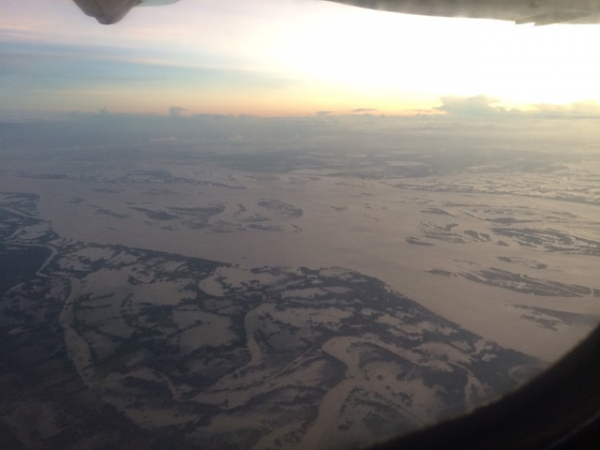
People in this flooded area lost all their food supplies and food parcels were made and distributed. A food parcel consists of 10 kg rice, 1 kg lentils, a liter oil and a kilo of salt. Last Friday a group of volunteers filled sacks with food parcels. They attempted to make 1960 food parcels. That is a lot of rice!!

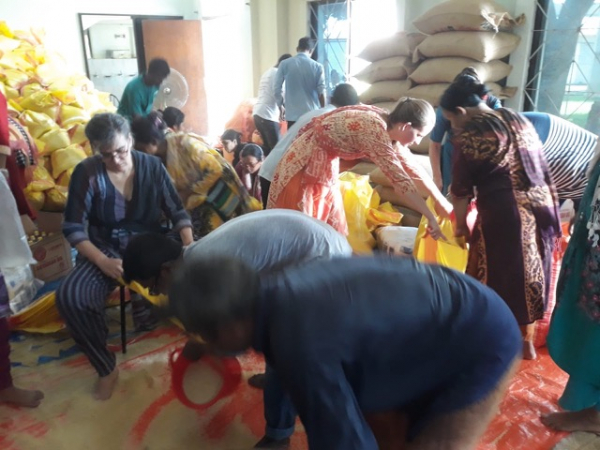
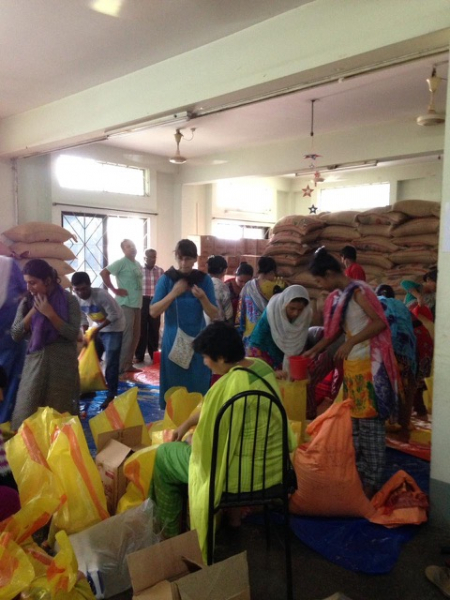
It is very satisfying to be able to do this, but my hands are not used to his type of work. I had several blisters on my fingers!
Happy New Year!
Written by Antje on April 30th 2019 15:26
Happy 1426! Last Sunday (14th April) we celebrated the inauguration of the Bengali new year. This year it coincided with Palm Sunday. In the morning (at 7.30 am!) we had a procession with palm branches and sang ‘Hosanna, Hosanna, the Prince of Peace has come!’ Unfortunately, I don’t have any photos of this. Then there was a church service to celebrate Palm Sunday. Usually Sunday is a working day and the palm procession happens in the evening, but this time it was joined with the new year festivities.
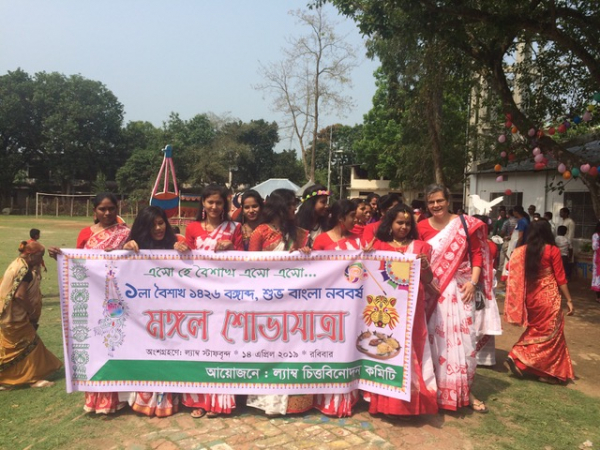
The new year was originally celebrated with a procession. The colours people wear for the new year are red and white. Many people continue this tradition of clothing.
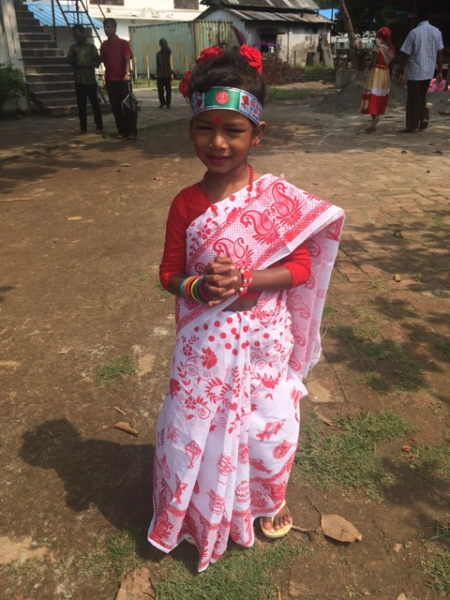
Little girls don’t normally wear saris, but they do for this occasion!
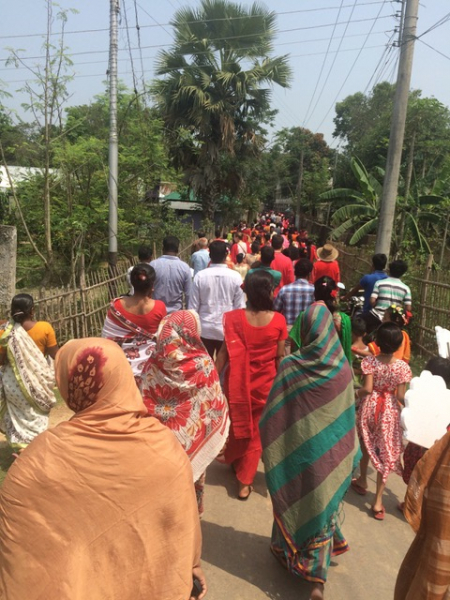
Lots of people on foot for the procession!

When we got back to the hospital grounds there was a dance, accompanied by a professional percussion band which was hired especially for the occasion.
If you look carefully you can spot me also dancing – the tallest person in the group 
Then there was a ‘Pantha bhat’: a traditional meal. This originates from the time when people cooked rice once every day, before refrigerators. Rice was stored in a layer of water. By morning was it slightly fermented. Ours was not fermented and tasted better ;-). It was served with a piece of fish, spinach and seasoned mashed potato. As you can see, it was popular (and free!).
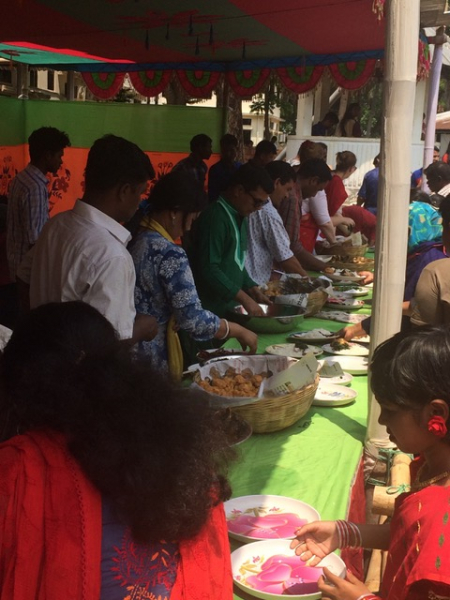
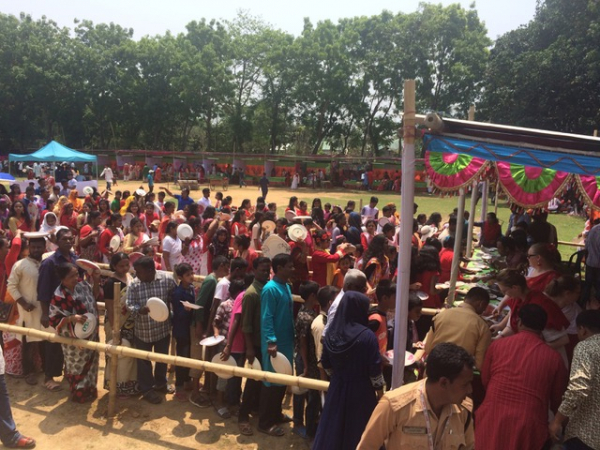
Serving the meal.
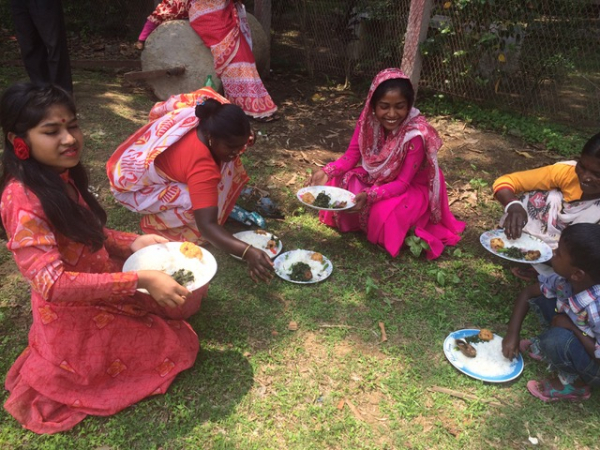
This is how it was eaten.

At the end of the day there was a three-hour cultural program in which children and adults could perform with singing and dancing. I made a short video of a group of our staff and student nurses who are descended from the Santal ethnic group and who performed a traditional dance. This dance is a little like the one I had taken part in earlier in the day.
I hope you had a very Happy Easter!!
Antje
Elections on December 30!
Written by Antje on January 1st 2019 19:36
